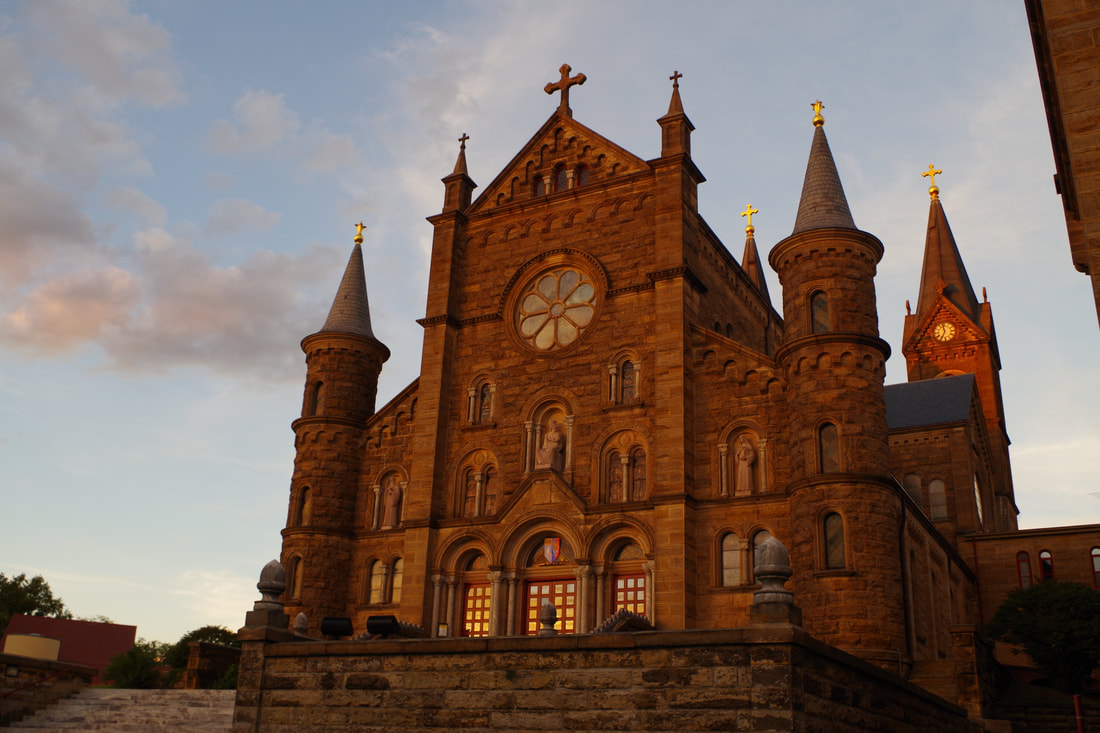 Today I facilitated a time of meditation and guided prayer for the Vanderbilt Divinity School community during their online worship. Since we're all in this 2020 boat together, I'm offering the same to you! __________________________ Mark 4:35-36 (NRSV) 35 On that day, when evening had come, he said to them, “Let us go across to the other side.” 36 And leaving the crowd behind, they took him with them in the boat, just as he was. Other boats were with him. Mark 6:31-32 (NRSV) 31 He said to them, “Come away to a deserted place all by yourselves and rest a while.” For many were coming and going, and they had no leisure even to eat. 32 And they went away in the boat to a deserted place by themselves. ___________________________ After days full of crowds and constant activity (& sometimes during days full of crowds & constant activity!), what did Jesus and his disciples do? They climbed into a boat. The boat offered refuge—it was a safe place to teach from, to take a break from the pressing crowds, to find rest. It was also a safe place to wrestle—to struggle with and against the waves, to puzzle with what had just been learned or witnessed. And it was a threshold place—floating on the surface of the deep unknown, in-between where they’d come from and where they were going (which also meant into the unknown). It was a vehicle of both transportation and transformation. If we were to continue on with our particular Scripture passages we would know what they didn't know. They were about to face a furious storm (although it wouldn't disturb Jesus' sleep which would disturb them even more!) and their plans for their place of rest were going to be thwarted. Boat-time was liminal space for them, kind of like 2020 is for us. The boat itself was a liminal place for them, kind of like Vanderbilt is for many, kind of like this worship time is for us. So what might happen in this time of liminality? Will we discover an invitation to rest in the middle of the storm? If we loosen our grasp on our plans for the future, what will we do now? Let’s climb into the boat for some guided prayer and find out! I invite you to close your eyes, maybe raise your shoulders and sigh deeply allowing your shoulders to drop and other places of tension in your body to begin to release. Giving yourself permission to continue to be here rather than the task or place you’re headed to after worship. As you allow for some slow, relaxed breaths, let each one draw you to the present, this place where you experience the Sacred Presence. Now in the quiet, listen to Jesus speak the same words to you that he spoke to his disciples, “Come away to a deserted place all by yourselves and rest awhile.” (2x) Imagine yourself leaving whatever or whoever has kept you busy, worried or even excited today or whatever or whoever is presently keeping you preoccupied, imagine leaving it, leaving them, and climbing into the boat with Jesus. Take a moment to notice what the boat and your surroundings look like (they might be old or modern day). You might notice where you choose to sit, who else may be in the boat, just take in the scene with all of your senses, what do you hear, see, touch, taste… What is the weather and water like in this moment? What time of day is it? What state are you in—mind & body? While you’re looking forward to going to a place of rest, you don’t know what will be waiting for you in the future, all you have right now is this boat and this moment. What do you need and what is being offered to you? Let the scene unfold. Maybe you voice your need to Jesus and a conversation happens, or maybe there’s an opportunity to rest awhile in the boat just as you are, or you might become aware of wisdom being offered you in regard to something you’ve been wrestling with. How is rest being offered to your body, mind, and soul, right here, right now? After a few moments in the silence you'll hear music playing and once it ends I'll offer a Benediction. Benediction: May you continue to climb into the Boat wherever you are with your situation however it is, and in this liminal space, may you find rest for your body, mind, and soul. In and through Christ and all our names for God, Amen.  Saint Meinrad Archabbey at sunset Saint Meinrad Archabbey at sunset I was supposed to be traveling today to Saint Meinrad Archabbey for a yearly 4-day Silent Retreat. It's one of my favorite places. I am always excited about facilitating this deep dive into the gift of Silence. Words don't do it justice. BUT the pandemic threw a wrench in my (& everyone's) plans. So, I decided that even though I won't be facilitating a retreat, I can share with you the theme that I picked out for it last year and we can enter into it wherever we find ourselves. We can still pray: "Make me an instrument of your peace." If there's ever been a time to pray this prayer that was written in the spirit of Saint Francis of Assisi, 700 years after his death by Father Esther Bouquerel of France in 1912, it is now!
Lord, make me an instrument of your peace Where there is hatred, let me sow love Where there is injury, pardon Where there is doubt, faith Where there is despair, hope Where there is darkness, light And where there is sadness, joy O Divine Master, grant that I may Not so much seek to be consoled as to console To be understood, as to understand To be loved, as to love For it is in giving that we receive And it is in pardoning that we are pardoned And it's in dying that we are born to Eternal Life Amen. ________________ "Blessed are the peacemakers," said Jesus, "for they will be called children of God." To be a peacemaker does not mean:
To be a peacemaker means we not only pray and enjoy peace, but we actively work for peace. For everyone. Not just ourselves. However, receiving inner peace enables us to extend outer peace...hence, the silent retreats. Silence offers an opportunity to slow down, to quiet the outer voices that we may look within and discover the inner voice of the God of Peace. Will you join me in reflecting, meditating, walking, dancing, stretching, playing, singing, resting, and working with this prayer over the next 4 days? Praying it first for yourself and your internal world: Lord, make me an instrument of your peace toward myself... Then praying it for those outside of yourself. Praying it on behalf of not only your family and nation, but the whole world. Praying to embody the words as you come in contact with the world--from those in your own house to the grocery store and social media. Let's breathe in and out the words of the "Prayer of St. Francis" and in so doing, may we become instruments and children of the God of Peace.  As a Spiritual Director, I’m on the lookout for “fake Jesus.” Whether during the very first session or sometime later through conversation, Ignatian contemplation or other kinds of guided prayer, the Jesus that a person has internalized arises. Remember, a person doesn’t have to be a Christian to have an image of Jesus that dwells within them, impacting the way they think about or view anything Jesus-related. Our image of Jesus, like our image of God, matters. This image is often pieced together in childhood. Early paper cutouts with fuzzy backs stuck to flannel boards, the voice and actions of a parent, pastor, or Sunday School teacher, experiences in Vacation Bible School, childhood books and pictures... In fact, it appears that even the Gospel writers may have pieced together a “Jesus” that didn’t always align with the authentic Jesus. Stephen Mitchell in his book, The Gospel According to Jesus: A New Translation and Guide to His Essential Teachings for Believers and Unbelievers, reveals how the early church writers included not only words and actions that Jesus likely said and did (since he didn't write anything down himself), BUT they also included words and actions they and their community needed him to say or do to fit their own beliefs! If what “Jesus” says is in opposition to the authentic Jesus’ main teachings (especially loving God and your neighbor as yourself), there’s a good chance the writer is making Jesus in his own image. This same “making-Jesus-in-our-own-image” and having him align with our own beliefs is on blatant display this political season! Now rather than being threatened by Mitchell’s idea, I find it’s helpful in developing skills in discernment. Remember, Scripture is “living” which means it “speaks” to us as we wrestle with it (which is to join in the lineage of the literal name of Israel!). It changes as we change and grow. Try living with a particular text, a story, a single Scripture for a month and notice how it changes (& how it changes you)! There is no end to new and deeper insights. Back to our images of Jesus…these images are rarely questioned. When an internal voice is associated with Jesus, a person automatically thinks it’s Jesus! So rather than simply agreeing with them, I listen to the person describe their interaction (always keeping in the back of my mind Jesus’ authentic teachings and his nature as revealed by his authentic teachings). Sometimes I’ll hear them say things like “Jesus has to knock me upside my head to get my attention.” If during a guided prayer, a door or a place of darkness often appears, “Jesus” will tell them not to look or go through it, to only focus on the light. Curiosity is helpful here. I’ll ask, “Whose voice does Jesus’ remind you of?” or “Why don’t you go back into your imagination and simply observe Jesus for a moment, what do you see?” Every single time, there is surprise. The response is often: “My whole life I thought it was Jesus’ voice I was hearing but it was actually my father’s!” "Oh wow, now that I'm looking closer, He looks like a flannel board Jesus. Kind of flimsy, not able to open the door.” “Jesus doesn’t really have much substance, he’s ghost-like, but as I watch he’s becoming more human.” And when Jesus becomes more human, more of his authentic self, they experience His great tenderness and strength. In doing so, their own tenderness and strength is called forth. With this Jesus, they find they are able to open doors and enter into places of darkness they never thought they could. With this Jesus, they are able to love the parts of themselves and the people they never thought possible. In other words, in coming in contact with the authentic Jesus, they are able to love their neighbor as they love themselves! Everywhere I look
there is clutter and imperfection Whether inside or outside Yes, inside or outside Do you work to contain, clean, remove and improve it? Or do you accept such a state? Either way, all I see is work. ___________
|
AuthorKasey is a scarf, ball and club juggling spiritual director just outside of Nashville, TN. Play helps her Type-A, Enneagram 1 personality relax, creating space for poetry and other words to emerge. She also likes playing with theological ideas like perichoresis, and all the ways we're invited into this Triune dance. Archives
January 2024
Categories
All
|
By clicking “Sign up for E-News” I consent to the collection and secure storage of this data as described in the Privacy Policy. The information provided on this form will be used to provide me with updates and marketing. I understand that I may modify or delete my data at any time.

 RSS Feed
RSS Feed

